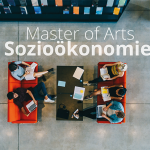Socioeconomics | University of Duisburg-Essen
The MA Socio-Economics at Duisburg-Essen University seeks to provide a pluralist, interdisciplinary and application-oriented approach to key socio-economic issues such as inequality, climate change and economic growth, public finances or the political impacts of socio-economic disparities. A pluralist approach to socio-economic issues is a foundingThe MA Socio-Economics at Duisburg-Essen University seeks to provide a pluralist, interdisciplinary and application-oriented approach to key socio-economic issues such as inequality, climate change and economic growth, public finances or the political impacts of socio-economic disparities. A pluralist approach to socio-economic issues is a founding
How does the programme provide content to ensure students achieve an understanding of a reasonably diverse set of perspectives on understanding economies?
How does the programme ensure students understand the interaction between economic and ecological systems?
In our approach, ecological systems are treated as an integral part of the socio-economic reality. Therefore, for example the introduction to macroeconomics includes references to the questions of planetary boundaries, climate budgets or the restrictions of traditional national accounting. As another example, ecological economics is included in the discussion of various economic paradigms in the module Economy – History – Philosophy. The module Inequality – Growth – Ecology also explicitly deals with ecological questions of socio-economics.
How does the programme ensure students understand how to critically explore real-world evidence, both qualitative and quantitative?
One of the three principles of our MA programme is its orientation towards application. This means first, that teaching revolves around key topical issues and the application of theory to them, be it inequality, climate change or economic crises. Second, methods teaching is designed to enable students to critically assess empirical studies, both qualitative and quantitative.
What pedagogical approaches does the programme use to ensure that students examine the historical context, assumptions and values in all economic thinking?
As part of our pluralist approach, we explicitly encourage students to think in paradigms and to deliberately choose analytical frameworks that suit the questions that have been raised. This is an overarching approach in our MA programme. But we also have a specific basic module on different economic paradigms (Economy – History – Philosophy) in which students learn about the existence, the historical emergence and context of and the implicit or explicit assumptions in different paradigms.
How does the department ensure that the teaching culture and capacity to deliver economic pluralism are continually improving?
Since our start in 2019, we have made permanent efforts to ask students to critically evaluate the programme and we have engaged in a regular dialogue with students as a follow up to the yearly evaluations. In this way we seek to permanently improve the quality of our programme and to live up to our claim of being an innovative MA in Socio-Economics as a pluralist, interdisciplinary and application-oriented programme relevant to our current and prospective students.
Country:
Germany
University:
University of Duisburg-Essen
Course name:
Socioeconomics
Department/school:
Institute for Socioeconomics
Course level:
Taught Masters
Course language:
German

 all programmes
all programmes